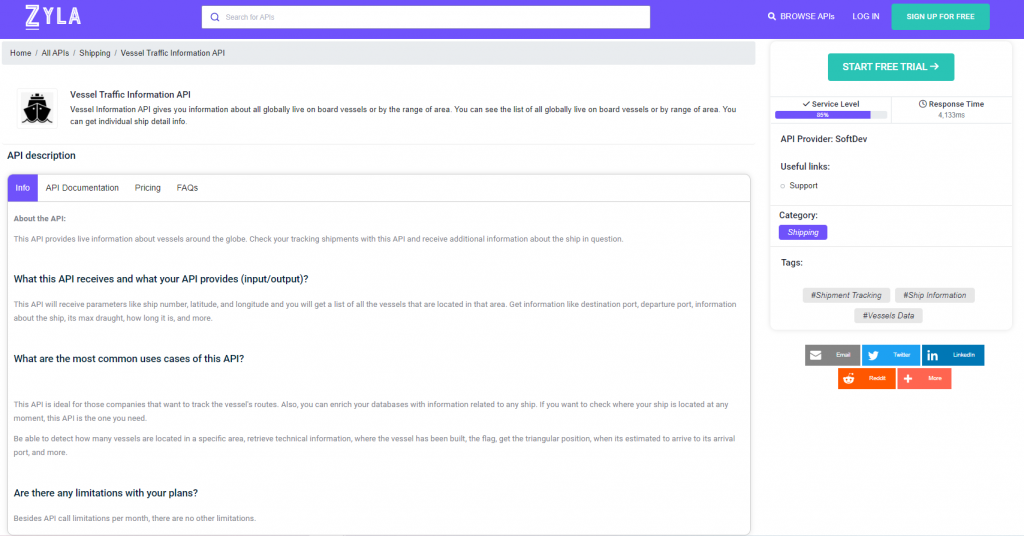In today’s fast-paced maritime industry, vessel data APIs are becoming increasingly popular among shipping companies, port operators, logistics providers, and other stakeholders. Vessel data APIs provide real-time access to data on vessel movements, location, and cargo, allowing companies to optimize their operations, reduce risks, and comply with regulations. Next, we will talk about some of the benefits of using a Vessel Data API.

Why Invest On A Vessel Data API?
Real-time vessel tracking
With a vessel data API, companies can track vessel activity in real-time across multiple ports and waterways. This allows them to monitor vessel movements, predict arrival times, and adjust their operations accordingly. Real-time vessel tracking also helps companies optimize their shipping routes, reduce fuel consumption and emissions, and improve their environmental performance.
Improved safety and security
Vessel data APIs can help companies enhance safety and security in the maritime industry by providing real-time information on vessel movements, cargo data, and weather conditions. This allows companies to detect potential risks and threats, such as piracy, accidents, or environmental incidents, and take action to mitigate them. Improved safety and security also help companies reduce the risk of loss or damage to vessels and cargo.
Compliance with regulations
Vessel data APIs can help companies comply with regulatory requirements and industry standards by providing data on vessel compliance with international regulations related to safety, security, and environmental protection. This allows companies to ensure that they are meeting their legal obligations and maintaining high standards of performance.
Enhanced business intelligence
Vessel data APIs can provide companies with valuable insights into market trends, customer needs, and business opportunities. By analyzing data on vessel traffic patterns, cargo volumes, and port activity, companies can identify new areas for growth and tailor their services to meet the demands of their customers. Enhanced business intelligence also helps companies improve their operational efficiency, reduce costs, and increase their profitability.
Easy integration
Vessel data APIs are user-friendly and customizable, making them easy to integrate into existing data management systems. This allows companies to access vessel data seamlessly and incorporate it into their workflows without disrupting their operations.
In conclusion, vessel data APIs offer a wealth of benefits for companies in the maritime industry, from real-time vessel tracking to enhanced business intelligence and compliance with regulations. By leveraging the power of vessel data APIs, companies can optimize their operations, reduce risks, and stay ahead of the competition.
Check This Vessel Data API:
Vessel Traffic Information API
As a developer, if you’re looking for a reliable and efficient way to access real-time vessel data, then the Vessel Traffic Information API is the perfect solution for you. This API software provides you with a wealth of information on vessel movements, location, and cargo to operations.

With the Vessel Traffic Information API, you can track vessel activity across multiple ports and waterways, monitor weather conditions, and receive alerts on potential incidents. The software is user-friendly, customizable, and compatible with various data management systems, making it easy to integrate into your existing workflows.
Whether you’re developing a maritime application, a logistics platform, or a business intelligence tool, the Vessel Traffic Information API can help you access the data you need to succeed. So why wait? Sign up for the Vessel Traffic Information API today and start leveraging the power of real-time vessel data.
Vessel Traffic Information API Endpoints
The API has a variety of endpoints, such as “GET VESSEL DATA BY SHIP ID” or “GET VESSELS BY GEO LOCATION.” Provide the required data and make the API call, and you will receive the information in seconds.
For example, if you choose the “GET VESSEL DATA BY SHIP NAME” endpoint, the Vessel Traffic Information API may provide responses such as:
{
"status": 200,
"success": true,
"message": "IMO Code 9270622 is valid",
"data": {
"imo_number": "9270622",
"vessel_name": "AQUAMAN",
"ship_type": "Offshore Tug/Supply Ship",
"flag": "Vanuatu",
"gross_tonnage": "2332",
"summer_deadweight_t": "2162",
"length_overall_m": "69",
"beam_m": "16",
"year_of_built": "2003"
}
}To make use of it, you must first:
1- Go to Vessel Traffic Information API and simply click on the button “START FREE TRIAL” to start using the API.
2- After signing up in Zyla API Hub, you’ll be given your personal API key.
3- Employ the different API endpoints depending on what you are looking for.
4- Once you meet your needed endpoint, make the API call by pressing the button “run”. Then, you will see the results on your screen.
Want to learn more? Check Comprehensive Guide To Ship Tracker API In 2023

